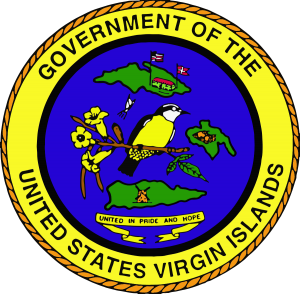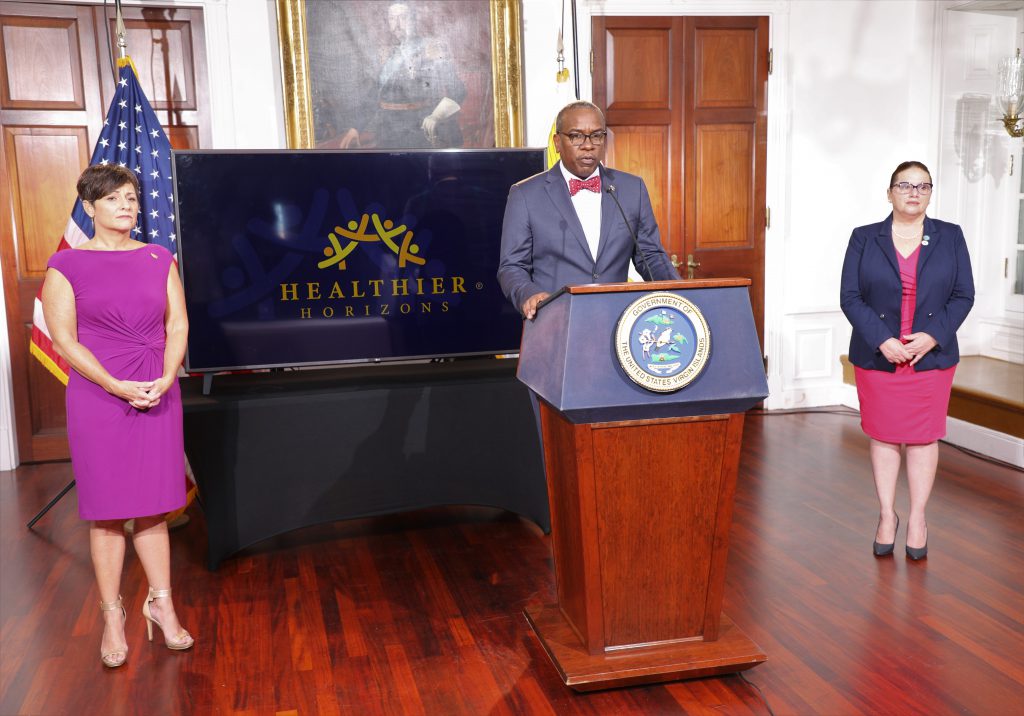U.S. VIRGIN ISLANDS — Governor Albert Bryan Jr. on Monday announced the start of his “Healthier Horizons” initiative, a sweeping reform of healthcare in the U.S. Virgin Islands.
Healthier Horizons is built on a foundation of three tenets:
- Increasing access to healthcare
- Modernizing the delivery of health services to residents
- Facilitating the rebuilding of our healthcare infrastructure
“My office, along with Commissioner Justa Encarnacion, Commissioner Kimberley Causey-Gomez, Dr. Julia Sheen and other agencies of the Administration have been steadily advancing a series of health initiatives to increase access to healthcare, modernize the delivery of health services to residents, and strategically facilitate the rebuilding of our healthcare infrastructure,” Governor Bryan said during a press conference Tuesday at Government House in Christiansted.
Under the “Healthier Horizons” umbrella, there are 11 primary elements designed to upgrade and modernize healthcare in the Territory:
- Behavioral Health and Developmental Disabilities
- Health Information Exchange
- Telehealth and Telemedicine Act
- Interstate Medical Compacts
- V.I. Fire Service and EMS Integration
- Emergency Medical Services Regulation
- Associated Health Plans
- Community Health Improvement Plan
- Healthy Housing Initiative
- Hospital and Health Facilities Improvements
- Medicinal Cannabis
“All of these health initiatives represent the type of progressive thinking necessary to transform our healthcare system given our limited resources,” Governor Bryan said. “I sincerely believe they will revolutionize the way we approach healthcare in the Virgin Islands for many years to come.”
Almost all of the 11 initiatives under Healthier Horizons already are in varying stages of progress.
Governor Bryan has submitted legislation to the 33rd Legislature regarding several of the “Healthier Horizons” elements, including the Virgin Islands Cannabis Use Act; a bill to create the V.I. Fire and Emergency Medical Services; and the Behavioral Health and Developmental Disabilities Act.
In addition, Governor Bryan launched a Telehealth Workgroup in January comprising members of the public and private sectors, including the Department of Health; Department of Human Services; LAN Communications; Broadband VI; Viya; The Plessen Group; TADAH; Continuum Care; V.I. Territorial Emergency Management Agency; Witt O’Brien’s; the Public Services Commission, V.I. Next Generation Network; Inner Circle Logistics; Island Analytics; and the Federal Emergency Management Agency.
The Telehealth Policy Workgroup has drafted legislation to create the Virgin Islands Telehealth Act, is developing Medicaid telehealth policies and providing guidance to the Health Insurance Board on recommended telehealth insurance coverage. The legislation for the Virgin Islands Telehealth Act currently is undergoing final review, and Governor Bryan expects to send it down to the Legislature within the next few weeks.
The Governor also launched the V.I. Healthy Housing Initiative, which is a partnership with local stakeholders and the Corporation for Supportive Housing to assess housing and healthcare services in four key areas: Behavioral Health, Youth Rehabilitation Services, Supportive Housing, and Elder Care Services.
The group went online last month for its initial meeting to begin a reassessment of the entire landscape of housing and healthcare-related services for at-risk residents of the U.S. Virgin Islands. A charrette is scheduled for the end of 2020 and Phase 3 of the three-phase initiative is scheduled to begin in spring 2012 with implementing recommendations and putting into place an overhauled housing and healthcare system in the Territory.
Governor Bryan also is exploring the use of interstate compacts for certain medical professions as a means to increase access to healthcare for residents, and current options include physical therapy licensure; nurse licensure and EMS Personnel Licensure.
Discussions are underway with the Chambers of Commerce in the Territory about establishing Association Health Plans, which allow small businesses, including people who are self-employed, to band together and obtain healthcare as if they were a large corporation. There are at least three private insurance providers that have expressed interest in offering a proposal to provide these benefits to Chamber members.
Currently, the Department of Human Services is using a $14.9 million grant from the Centers for Medicare and Medicaid Services to establish a Health Information Exchange for Medicaid patients. The exchange will allow doctors, nurses, pharmacists and other healthcare providers to access and securely share a patient’s vital medical information electronically, improving the speed, safety and cost of patient care.
Additionally, repairs and enhancements to the Territory’s hospitals and clinics is ongoing, and the facilities are at varying stages of recovery from the 2017 hurricanes.

